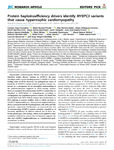Protein Haploinsufficiency Drivers Identify MYBPC3 Variants That Cause Hypertrophic Cardiomyopathy

View/
Use this link to cite
http://hdl.handle.net/2183/28533
Except where otherwise noted, this item's license is described as Atribución-NoComercial-SinDerivadas 4.0 Internacional
Collections
- Investigación (FEP) [514]
Metadata
Show full item recordTitle
Protein Haploinsufficiency Drivers Identify MYBPC3 Variants That Cause Hypertrophic CardiomyopathyAuthor(s)
Date
2021-06-05Citation
Suay-Corredera C, Pricolo MR, Herrero-Galán E, Velázquez-Carreras D, Sánchez-Ortiz D, García-Giustiniani D, et al. Protein haploinsufficiency drivers identify MYBPC3 variants that cause hypertrophic cardiomyopathy. J Biol Chem. 2021;297(1):100854. https://doi.org/10.1016/j.jbc.2021.100854
Abstract
[Abstract] Hypertrophic cardiomyopathy (HCM) is the most common inherited cardiac disease. Variants in MYBPC3, the gene encoding cardiac myosin-binding protein C (cMyBP-C), are the leading cause of HCM. However, the pathogenicity status of hundreds of MYBPC3 variants found in patients remains unknown, as a consequence of our incomplete understanding of the pathomechanisms triggered by HCM-causing variants. Here, we examined 44 nontruncating MYBPC3 variants that we classified as HCM-linked or nonpathogenic according to cosegregation and population genetics criteria. We found that around half of the HCM-linked variants showed alterations in RNA splicing or protein stability, both of which can lead to cMyBP-C haploinsufficiency. These protein haploinsufficiency drivers associated with HCM pathogenicity with 100% and 94% specificity, respectively. Furthermore, we uncovered that 11% of nontruncating MYBPC3 variants currently classified as of uncertain significance in ClinVar induced one of these molecular phenotypes. Our strategy, which can be applied to other conditions induced by protein loss of function, supports the idea that cMyBP-C haploinsufficiency is a fundamental pathomechanism in HCM.
Keywords
Cardiac myosin-binding protein C
Hypertrophic cardiomyopathy
Bioinformatics
Alternative splicing
Minigene
Protein stability
CD
Variants of uncertain significance
Hypertrophic cardiomyopathy
Bioinformatics
Alternative splicing
Minigene
Protein stability
CD
Variants of uncertain significance
Editor version
Rights
Atribución-NoComercial-SinDerivadas 4.0 Internacional
ISSN
0021-9258






